Nepal Relief Efforts Update: A Letter from Tevel B’tzedek
After devastating earthquakes in Nepal, Leichtag Foundation has granted emergency funds to Tevel b’Tzedek and The American Jewish Joint Distribution Committee (JDC) who are on the ground engaged in immediate and long-term relief efforts. We recently received an update from Tevel b’Tzedek. Here is the letter we received:
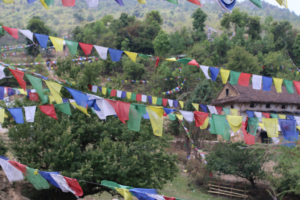 Dear Friends,
Dear Friends,
As one of our key supporters, I wanted to update to you about our activities in the wake of the Nepali quake.
Or quakes. On Tuesday our world in Nepal was shaken again. In the early afternoon, Nepal suffered another massive earthquake, this time centered east of Kathmandu, towards Mount Everest. One of our working areas, Sundrawati in Dholikah district, is right near the epicenter, and was already heavily damaged. The villages in which we were working in the Ramechap district, our main area of activity in the last year and a half, were also hit hard in this latest quake.
I have learned a lot about trauma since the earthquake, and I know just how fragile everyone who experienced the first earthquake feels. Like buildings that have been cracked, and then experience another shaking, psyches which have already been affected by the quake are now going to take longer to heal. All this makes the work we are doing, working within the communities which we know well, all the more crucial.
After the earthquake, many international NGO’s poured into the country, to help with search and rescue, injuries, and other urgent tasks. For many of these organizations, this was their first time in Nepal. Our core strength is that we have been working in Nepal for 8 years, and have a deep and intimate knowledge of the country, and especially the village areas, as well as an extensive (more than 50 people) Nepali staff and Nepali fellows.
This has enabled us to go deep into communities in the wake of the quake and begin quickly to respond. It has also meant that organizations such as the Joint Distribution Committee and Jewish World Relief have recognized the value of our experience, passion and infrastructure and have reached out to partner with us during this critical period.
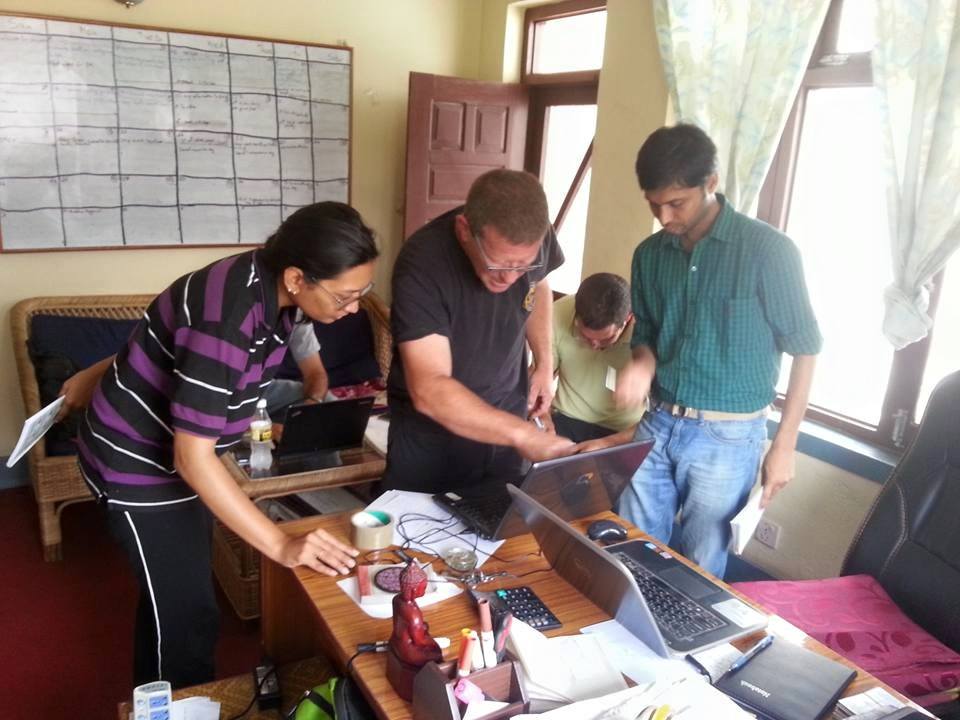
Israeli and Indian architects/engineers working together to design cheap and earthquake-resistant building based on locally available materials after visiting the earthquake-affected areas mainly in the Dhading district. In the meanwhile, the Tevel-Nyayik Sansar office is filling up with supplies to go out the villages.
So, what have we actually been doing?
Aiding villagers in the creation of temporary (semi-permanent) shelter for themselves and their animals, in advance of the monsoon that is expected to begin within the month.
To this end we have begun buying enough tin roofing for temporary dwellings to be distributed in all our village areas. After due consideration, we chose tin because it is far more durable than canvas tarps, and can be used again for permanent housing. In addition, we brought two volunteers, a building engineer and an expert in mud building, from Israel to Nepal. Beginning on Tuesday, they travelled out to our village areas with two architects from one of our new partners, the All India Disaster Mitigation Institute, in order to help villagers design the most durable and effective temporary shelter. They will conduct a participatory workshop in each village, creating a model of the ideal temporary structure together with the villagers. In addition, our team, including the building engineer, will help determine whether some of the houses might still be livable.
At present, we are making an assessment of the number of household to which we will provide tin. We have recently learned that nearly all damaged houses, even if they are only cracked, are unsalvageable and will have to be demolished and rebuilt again. This has moved our estimation of the number of households in our communities that will need tin roofing support upwards from 900 households to 3,800 household, representing more than 25,000 people (households often include 3 or even 4 generations). Our estimate of the cost for the tin alone, without transportation, is approximately $200,000.
Medical treatment and health:
Tevel has brought medical teams to 5 village areas as well as 2 city slums. These teams have treated upwards of 500 people in an effort to stop the spread of communicable diseases. Sanitation: Nearly all of the outhouses in the village areas have been destroyed; there is an urgent need for sanitation to prevent diarrhea or in worst case scenario, Cholera. Tevel volunteers are digging communal toilets, and have brought initial chemicals for sanitation and material for creating gender privacy. Our volunteers and staff have also helped build temporary communal toilets in 4 villages. Our volunteers and staff have also done educational workshops on sanitation attended by a total of upwards of 500 villagers, and will continue working to raise awareness at this crucial time through our women’s groups and youth groups in each village. Tevel is supplying soap, water purification tablets, sanitary pads, toothbrush and toothpaste and other essential hygiene materials in the village and city.
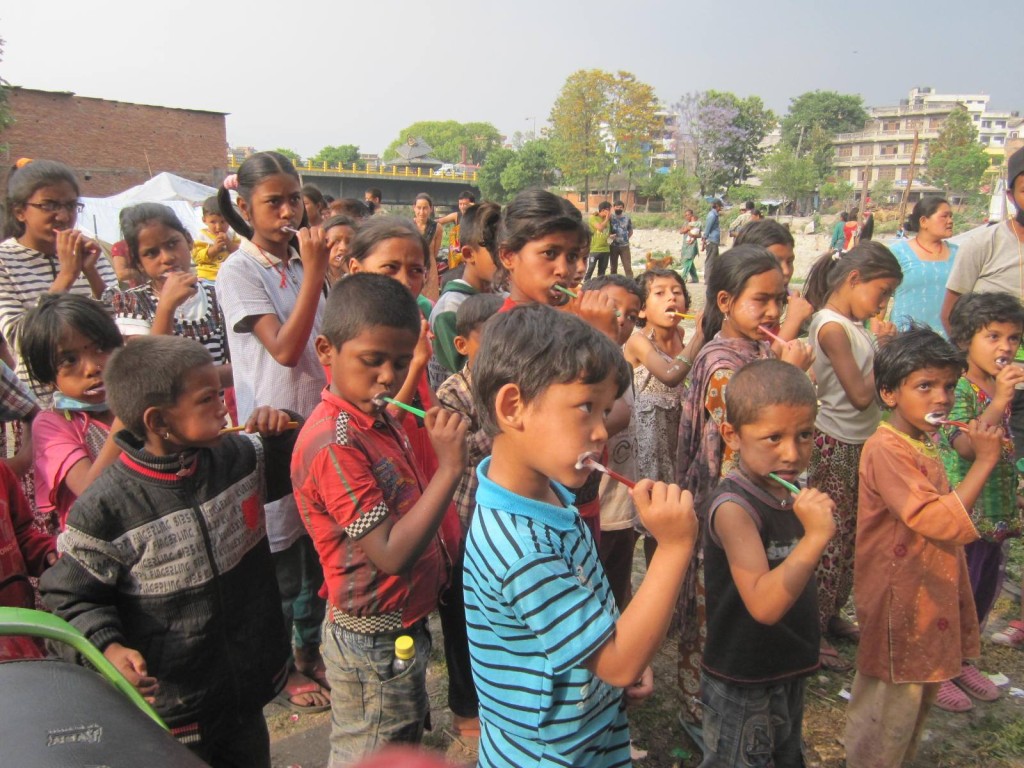
After natural disasters and displacement there is an increased risk of disease and widespread illness. To prevent outbreaks in our working areas we are promoting healthy living by distributing hygiene supplies and conducting campaigns about the need for tooth brushing and hand washing.
Psycho-Social: Tevel’s volunteers in Nepal from The Israel Center for Psychotrauma have conducted workshops for our Israeli staff and volunteers, our Nepali staff and volunteers, and for villagers in two of our village areas. We will continue to work with psychologists and trauma experts in this crucial field; psychological healing is necessary both in and of itself and also for the pursuit of practical action.
Food Distribution: Urgent issues of food security have risen in some of our areas, including Dohlika (Sundrawati) and in city slums as well as in villages not connected with Tevel. In total, Tevel has distributed approximately 7 tons of rice in emergency food aid.
Temporary Learning Spaces: With schools not functioning, Tevel volunteers have created and man temporary learning spaces in 3 village and 1 city area, involving upwards of 200 children in activities that keep them away from dangerous rubble and reintroduce the routing of learning into their lives. Meanwhile, our day care center for 1 to 4 year olds has reopened, with dozens of migrant families seeking to place their children in our safe space while they navigate living conditions in the open, and attempt to return to work.
Longer term rehabilitation plans: Tevel’s staff has been working to create an exciting long term plan for rehabilitation over the next two years, in which we will use our core strengths—our strong connection to rural and urban communities, our knowledge of agriculture, and our women’s and youth groups—to reach far beyond our home communities to work for rehabilitation and restoration in Nepal.
Alumni: One clear take-home from this crisis period is how connected and devoted our alumni are. In Israel and in the United States, our alumni have pitched in, organizing a series of events—from concerts to parties—in 4 different cities in order to raise money for our earthquake relief efforts.
As part of our key and treasured group of supporters, we will continue to update you about our short and long term response to the quake.
Thanks so much for your ongoing support!
Yours Very Truly,
Micha Odenheimer
Founding Director
Tevel B’tzedek

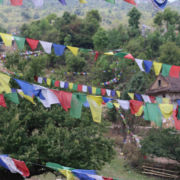
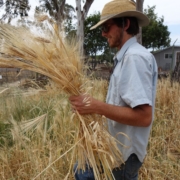




 Stacie and Jeff Cook understand commitment. They live it.
Stacie and Jeff Cook understand commitment. They live it. Black, Jewish and Queer. These three identities weave the fabric of who I am, but it took a long time to believe that they could exist together.
Black, Jewish and Queer. These three identities weave the fabric of who I am, but it took a long time to believe that they could exist together. Lee and Toni Leichtag established the Leichtag Foundation in 1991 following the sale of their business. Lee and Toni were lifelong entrepreneurs with a passion for innovation and for supporting talent. They believed that only with big risk comes big reward. Both born to families in poverty, Toni to a single mother, they strongly believed in helping those most in need and most vulnerable in our community. While they supported many causes, their strongest support was for young children and the elderly, two demographics who particularly lack voice in our society.
Lee and Toni Leichtag established the Leichtag Foundation in 1991 following the sale of their business. Lee and Toni were lifelong entrepreneurs with a passion for innovation and for supporting talent. They believed that only with big risk comes big reward. Both born to families in poverty, Toni to a single mother, they strongly believed in helping those most in need and most vulnerable in our community. While they supported many causes, their strongest support was for young children and the elderly, two demographics who particularly lack voice in our society. Lifelong Baltimoreans, Rabbi George and Alison Wielechowski and their sons, 11-year-old Lennon and 9-year-old Gideon, are more than pursuing the good life in Southern California. Having moved to San Diego more than three years ago, they are fulfilling a lifelong dream.
Lifelong Baltimoreans, Rabbi George and Alison Wielechowski and their sons, 11-year-old Lennon and 9-year-old Gideon, are more than pursuing the good life in Southern California. Having moved to San Diego more than three years ago, they are fulfilling a lifelong dream.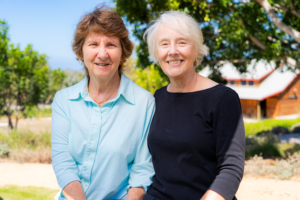

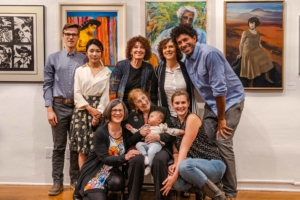
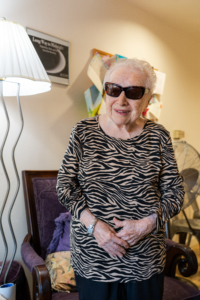


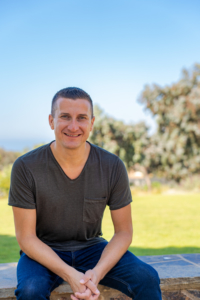 You would think that as the executive director of San Diego LGBT Pride, Fernando Zweifach López Jr., who uses the pronoun they, has done all the coming out they possibly can. A queer, non-binary individual who has worked for many years on civil rights issues, López also speaks openly and often about their father’s family, Mexican-American migrant workers who tilled the fields of rural California.
You would think that as the executive director of San Diego LGBT Pride, Fernando Zweifach López Jr., who uses the pronoun they, has done all the coming out they possibly can. A queer, non-binary individual who has worked for many years on civil rights issues, López also speaks openly and often about their father’s family, Mexican-American migrant workers who tilled the fields of rural California.